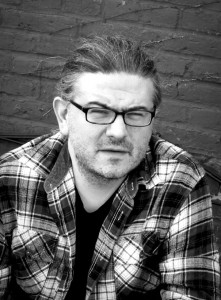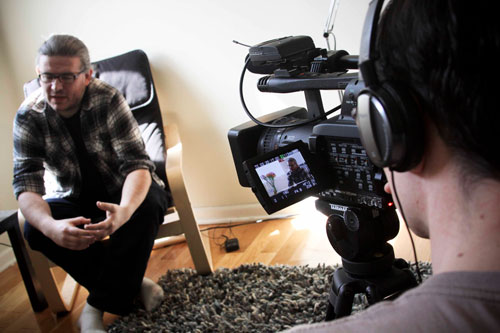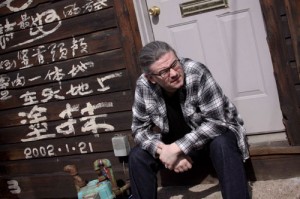“It’s like someone put another persona into me”: Interview with Ismet Prcic
by Robert Isenberg / April 16, 2012 / 1 Comment
Ismet Prcic fled Bosnia and the Balkan conflict in 1996, but he did not escape the war. Although the veteran actor settled in California and tried to reinvent himself, he gradually decided to write a book about the war he left and the country he found. His first novel, Shards, has won critical acclaim for its unflinching portrait of violence and refugee plight, and divides its attention between two characters: Ismet Prcic, based on the author’s actual experiences, and Mustafa Nalic, a soldier who stays to fight grueling battles in the former Yugoslavia.
Prcic came to Pittsburgh in March for a reading sponsored by City of Asylum/Pittsburgh. In this interview he discusses the seven year process of writing Shards, the sometimes fine line between reality and fiction in the novel, and the ways in which war can restructure the fabric of life as we know it.
Reading your book, the word that came immediately to mind is “hip.” It’s very dynamic, it’s very youthful. Sometimes it’s really crass. How did you develop this voice?
I think I had my second childhood in Thousand Oaks, California. When you immigrate and move to another country, [your life] starts all over again. I was nineteen years old, and when I went to college I was in my twenties, and all the other kids were in their teens. I listened to what kind of jokes they told, and how American teenagers spoke. F-bombs abound, you know? There’s also a part of me that’s rebellious. I’ve always been a good boy, to a point—until I start to see through the bullshit. To kids, Mom and Dad are Superman and Wonder Woman. But then at some point you realize they have no clue how to raise children. They’re just trying they’re best. You think, “My version is just as good as yours. So, okay, I’m going to come up with my own version.”
Was it helpful to write in a second language?
Oh, yeah. I couldn’t write anything like this in Bosnian, because I knew the language so well that it actually stifled me. Writing in English opens me up.
I feel like the best-kept secret in Europe is the Bosnian sense of humor. It’s so dry and funny. Humor is important to this book. How do you reconcile the humor in the text with the subject of war?
I have to. I come from theater, and in theater, everything is contrast. In order to make something sad and terrible, you juxtapose it against something funny and humorous. In Shakespeare, every tragedy has a clown come in, with a mandolin or something, and play a humorous song. Even in Hamlet, you have the graveyard scene. The way I was writing it—maybe it was just in my genes—I would write a terrible thing, like a family breaking apart, and I would realize, “Oh, this is too much.” And then I would put in a joke. Then I would think, “Now it’s too frivolous.” I would go back and forth. Some of it gets lost in the editing process.
One of the themes in the book is to “write everything.” What does that mean?
I took a class with Raymond Federman on [Samuel] Beckett, and he said that the difference between James Joyce [and Beckett] is that Joyce wrote everything. In Ulysses, you take one day and expand it to every different aspect of life. And then Beckett did the opposite thing. He took everything away, until there’s just bare bones.
I was a theater artist for so long. When you engage with that kind of art, it’s easy to get things out of your system, because you’re onstage and you’re sweaty, you’re getting it all out, and then you feel good for the next day, so you do it again. When I came to America (I stopped doing theater in 2004), I missed that way of expression. Then all of that trauma, all of the things that I survived and endured,were building inside. I was trying to find a way to get it out. So I would sit down and take that kind of experience and write it out. I didn’t have money to get a shrink, so I would tell it to the paper. Which is a dumb way to write a novel, because it takes you seven years.
It sounds almost like you start with Joyce, and it becomes Beckett.
Yeah. Beckett is my man. Joyce, not so much.
There is a scene where the protagonist gets his friend to dress up as a ninja to impress some girls but the villagers mistake the event for a terrorist attack at the onset of the war. How did this scene come about?
That is actually set in reality. It didn’t exactly happen that way, but it did happen to me. We created this kind of play, this spectacle. Then all the grownups came down, and it was kind of terrifying. But I thought, “They actually believe in my creation. That’s awesome!”ca
What was so striking in the novel is the feeling that when terrible events happen a person can feel personally responsible. Did you have that feeling?
Everyone is responsible, because we buy into reality. That’s the thing that really freaked me out. War is the best teacher in the sense that it wakes you up from reality. Everything you believe in, that you ever believed in, suddenly turns to shit. You think, you can’t kill people, you can’t beat people up. Then the war starts, and you’re supposed to do that. You believe in money—my family on my father’s side was really rich. And then the First World War started, and [they] lost it all. How can you believe in money after that? If you spend forty years of your life trying to build security based on this thing, this money, that is actually a bunch of agreements made by other people, a bunch of projections about the market, and none of it is real—at some point, someone can just change their mind. All your life, if you base it on money, can just go away. I have seen it with my own eyes, from my own experience. Everything is based on people’s perception. Nothing is sent to us from God. We believe that, but it’s not. It’s all a bunch of people making laws and changing them, sometimes capriciously.
Where did Mustafa come from?He started off as a character I invented. I heard some stories, and I invented the character because I wanted to have a dichotomy. I wanted to have a person who leaves and watches the war from the outside, and a person who is in the war, feeling it viscerally. At some point these narratives collapse into each other, and you have no clue which one of them is real.
But in one of those instances, when truth is stranger than fiction, I got Facebooked by a [real] guy named Mustafa Nalic, who lives in London, who is from my town, whose grandfather was an imam, who fought in the war, barely survived, got hurt, and lives in London with a woman who lived in a building next to mine in Bosnia.
Really?
I’m not even joking. He was so scared. He was afraid that I was stealing his life, that I was exploiting him. The book wasn’t even out. He was just reading bits and pieces of it off the Internet. I immediately sent him the book and tried to tell him that this is an invention. It just happens that you have the same name. His wife read it first and said, “I lived next door to you!” She was maybe two years older than me. She said, “Oh, this is great writing!” And then he read it, and I think he was kind of drunk at the time he wrote me. He said, “You’re character’s not a patch on the ass of me! I’m really a hero!” But at the same time he said, “Great job, and blah-blah-blah.” It was really bizarre.
One of my favorite moments is when your protagonist dreams about returning to Bosnia. He wants to wear sunglasses and grow a beard and watch the people he used to know. Is that something you desire?
I don’t know. I think by the end of the book, I was trying to make the ending ambiguous, and leave it open to interpretation. Maybe Ismet created this whole thing. Who knows? I don’t know how to explain really. But I often have these fantasies about disappearing, and I think it comes from trauma. I was kind of a scaredy-cat my entire life, and I never took chances. Then I had to escape and it almost felt like I was outside my body watching myself do these crazy things that I would never dare do, but I did them. In a way it seems like, after that experience, I trust life. It’s almost like you trust fate. I almost don’t believe in freedom of will after that experience because it’s like someone put another persona into me, and got me out of the bad situation, then took that persona back, and I was suddenly the same guy as before, but in a different environment.
Theater is often a great way to break out of your shell, yes?
Yeah! I was six years old when I started going to school, and I was a chubby kid. There were these bullies down the street who would catch me, beat me up, spit on me, and do all these terrible things. At some point—again, I was six—my teacher took me to a drama club where I realized that, if your performance is good, if you act differently, people will see that performance, perceive it, and act according to what you’re giving them. After a while I realized I could use this acting stuff to make my life easier. So whenever I saw the bullies, I would go to a random grownup, and say, “Hello, sir, can you help me walk over there… I’m just scared because my mom…” and I would come up with a little story. They would say, “Oh, sure. What’s your name?” I would end up walking with them, and the bullies would just sit there, going, “Oh, he’s safe, because he’s with a grownup.”
As I got older it escalated even more. At the end of eighth grade I realized I was going to go into a high school where nobody was going to know me, so I could come up with a new persona, because nobody would know, right? So the first day of class, I just created this garrulous, crazy, wild man who’s not afraid to look foolish. Just, “Blah! I’m gonna say whatever comes to my mind!” Like I didn’t give a crap. And everyone was like, “Oh, this guy’s cool.” By the time they realized I’m actually a wuss, it was too late. Everybody knew my name, and I actually had a pretty awesome time in high school. I achieved this new persona.
My first literary introduction to the Bosnian war was Alexandar Hemon. Can I ask you how your work has been affected by him?
In the year 2000—I think it was called the Out of Bosnia Festival in London, in Riverside Studios—they brought all these filmmakers, playwrights, and writers from Bosnia for a week of Bosnian culture. Alexandar Hemon had just had his first book published, The Question of Bruno. I was there with a theater troupe, and we did theater at the same place. I was mad at our director because of something he did, and I faked an ulcer attack because I didn’t want to go with the whole group for another night of him doing whatever he wanted to do. I said, “No, I’m just going to stay in this room.” But [the director] felt bad, so he went to [Hemon’s] reading, and he bought a book and had it signed, and he said, “There’s this dude in America who also likes to write,” and Alexandar Hemon writes his email address in the back of my book. My director comes back and brings me the book.
So I start reading this book, and as I’m reading it, I’m like, “Fuck you, fuck you, fuck you.” Because this is my story. Because I wanted to write a broken book about my experiences, and he was writing it. It kind of shut me down for a year or two. I couldn’t write anything. Here’s a genius; what am I going to do? I’m going to go into construction, I guess.
But then, over time, I went to school and took some writing classes, and my peers were like, “This is good stuff.” I realized that I actually have my own story to tell. [Hemon] writes from the point of view of being on the outside looking in, and I had the luck, or bad luck, to see the war from both sides. I thought, “Maybe that can be different enough.” Finally, after a year, I wrote him a letter, and I asked him, “How do you write like this? How do you take these amazing sentences, these little vignettes, and turn them into a cohesive story?” And what he said just opened me up for the rest of my life. He said something like, “You have a life story, and for that, there is no form that exists already. You cannot take an amorphous, crazy, chaotic life and shove it into a mold that already exists. You have to find a form that fits your experience.”
Do you have a routine when you write?The way I wrote this book was always either in-between classes… [or] what I would do is I would wake up early in the morning, like four o’clock, and I wouldn’t brush my teeth, I wouldn’t eat, I would just go straight into my little cave and start writing. And by the time I started being aware of what I was writing, I would stop creating. Then brush my teeth, get something to eat, come back, and look at what I had. It’s almost like writing when you are not awake. So that was my M.O. Getting up early, that’s the way to do it. I can’t do it at night. Night is my relaxing time.
What do you think about literary contests?
Literary contests—I don’t know anything about that. I never sent anything in if you had to pay money to enter, because that seems like a scheme. Also, MFA’s—there are so many of them—but one rule to follow is to not pay for them. If your tuition is covered, if they’re paying for it, go for it. And go into it with a project in mind. I’ve seen people who come in based on really good writing, and then they’re like, “Cool! I’m back in school! I’m just going to experiment!” And then it’s two years of just experimenting with this and that, and then you still have nothing. The ones who succeed say, “I have a book in mind.” Then it works.
Do you ever feel censored?
I don’t think so. I think I fought really hard to write the book that I wanted to write, in the way that I wanted to write it. And even though I was approached by agents and people who had different views of what my story should be, I kept denying them and saying, “No, no, I need this kind of craziness, I need this kind of ambiguity, I need this almost gimmicky approach to writing.” This theatrical approach to writing, in order to tell this story the way I wanted to tell it. Let’s say the ending of the book was a hundred pages of craziness, of complete and utter chaos—good pieces of writing, but not connecting in any way. I realized, I don’t need a hundred pages of that. If I can do that in fifteen pages, it strikes the tone and finishes the book the way I wanted it without indulging. It took seven years to realize I’m full of shit.
Do you consider yourself an exiled writer?
I don’t know if I’m exiled. The weird thing about me is—again, talking about fate—I always felt like I was going to live in America. As a kid, watching cop shows, I was like, “I will be there one day.” I always paid attention to the American movies. The reality of America disabused me of the notion of America I had before. But for some reason I always knew I was going to live here. It was almost like waiting to get there. It’s a weird feeling, and a lot of people don’t understand it. But I always had this trust of life, that it’s always going to take me to where I need to be. My ex-roommate used to joke, “You meet the right people at the right time, every time. That’s not possible. It never happens to any of us. What is wrong with you? Do you have special powers?” And I’m like, “No. It’s a matter of just trusting that everything’s going to be all right. That morning takes care of itself. What needs to happen is going to happen. Within that framework, you just try to make the best of things.”








One Comment on "“It’s like someone put another persona into me”: Interview with Ismet Prcic"
Trackbacks for this post